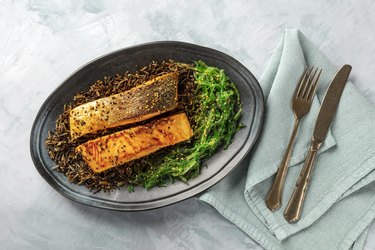
Unless you're catching your salmon yourself, or the fish has been flash frozen as soon as it's been plucked out of the water, it's possible that your salmon may have a fishy taste. But there are some tips and tricks that may remove fishy taste from salmon.
Salmon and Your Health
Video of the Day
According to Seafood Nutrition Partnership, Americans are eating more seafood, including more salmon. In fact, salmon is the second most popular seafood choice in the United States, preceded only by shrimp.
Video of the Day
Salmon may be so high on the list due to its health benefits. This fatty fish is rich in omega-3 fatty acids, which are essential fats that support brain and heart health. The American Heart Association recommends you eat fatty fish like salmon twice a week to reduce your risk of having a heart attack or stroke.
Salmon is also low in calories, high in protein and an excellent source of many essential nutrients needed for good health. According to the USDA, a 3-ounce serving of cooked wild Atlantic salmon has:
- 155 calories
- 22 grams of protein
- 7 grams of fat
- 5 percent of the daily value (DV) for iron
- 30 percent of the DV for copper
- 72 percent of the DV for selenium
- 108 percent of the DV for vitamin B12
- 47 percent of the DV for vitamin B6
Unfortunately, salmon is a source of mercury. Excess exposure to mercury is toxic and can affect the nervous, digestive and immune systems. To get the health benefits without getting too much mercury, Harvard Health Publishing recommends consuming no more than 6 ounces of salmon a week.
Fresh is Best
Salmon may offer a lot of health benefits, but many people have a difficult time eating the healthy fish because of its fishy taste. To remove fishy taste from fish, you need to make sure what you're buying is as fresh as possible. According to the University of Minnesota Extension, fish tastes fishy due to poor handling.
When buying fresh fish, smell it before you bring it home. Fresh fish shouldn't smell fishy. It should smell fresh and the flesh should be firm, not mushy. When buying frozen fish, avoid any packages that have frost or ice crystals, which indicates the fish may have thawed and then refrozen.
Once at home, store your salmon tightly wrapped in the coldest part of your refrigerator and plan to cook it that day. If you're unable to prepare your salmon immediately, place your fish in a tightly sealed freezer bag and freeze right away. Frozen fish can be stored for up to six months in the freezer, and it's best to defrost fish overnight in the refrigerator.
While salmon certainly makes a healthy fish choice, it may still be too fishy for some people. According to the food experts at On the Gas, the least fishy fish for those who don't like fish include flounder, tilapia, cod and arctic char.
Remove Fishy Taste From Salmon
If your salmon is still too fishy, there are cooking tricks that may help lessen the fishy taste. The professionals at Epicurious recommend soaking your fish in milk for 20 minutes prior to cooking. The protein in the milk binds with the fishy odors and removes them, leaving behind a sweeter, brighter and cleaner-flavored fish.
If you've already cooked your salmon, squeezing fresh lemon over the fish may help add freshness to the flavor and dull the fishiness. You can also create various sauces to serve with your salmon to help remove fishy taste from the fish.
Make a healthy dill sauce by mixing together nonfat Greek yogurt with fresh dill, lemon juice and garlic and serve over your cooked salmon. Or create a lemon-butter sauce made with butter, juice from a fresh lemon, chopped shallots and white wine, sauteed over medium heat until the shallots are cooked.
You can also add a sweet honey or brown sugar glaze to your salmon before cooking to improve flavor for those who have a more difficult time with the fishy taste of fish. Or look for salmon recipes that suite your taste to improve the flavor of your fish.
- Seafood Partnership: "News Update: U.S. Per Capita Seafood Consumption Up in 2017"
- American Heart Association: "Fish and Omega-3 Fatty Acids"
- USDA FoodData Center: "Fish, Salmon, Atlantic, Wild, Cooked, Dry Heat"
- MyFoodData: "Wild Atlantic Salmon (Cooked)"
- Harvard Health Publishing: "Make Smart Seafood Choices to Minimize Mercury Intake"
- World Health Organization: "Mercury and Health"
- University of Minnesota Extension: "How to Avoid Fishy Tasting Fish"
- On the Gas: "5 Best Fish for People Who Don't Like Fish"
- Epicurious: "Want a Less Fishy Fish? The Answer is Milk"